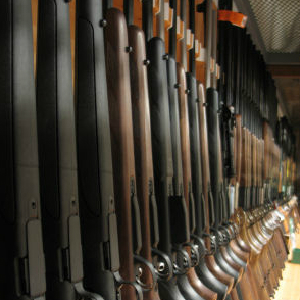Steve Balich Editors note: Article 7 Section 1 of the Illinois Constitution says "The State militia consists of all able-bodied persons residing in the State except those that are exempted by law"
Is the 2nd Amendment really about the militia?

This article was originally published on Worldview Warriors on March 6, 2018.
In the wake of the school shooting in Parkland, Florida, America has once again turned her collective attention to the Second Amendment. Our nation is split between two competing views of this small portion of our Bill of Rights. On the one hand, there are those like Jeffrey Toobin, a contributor at CNN and The New Yorker, who claims that “the amendment conferred on state militias a right to bear arms — but did not give individuals a right to own or carry a weapon.”
And on the other hand, there are those who take the position advanced by Dana Loesch of the National Rifle Association in CNN’s town hall on gun policy. When asked how the Second Amendment applied to the gun policy debate, Loesch answered that, “In the context of the time, a ‘well-regulated militia’ meant an American man, an American woman, a citizen of the United States of America who could operate and service their firearm.”
These two competing statements offer a nearly complete overview of the current gun control debate. Those in favor of gun control claim that the 2nd Amendment only applies to militias, and those opposed to gun control respond by claiming that every American citizen is part of the militia. Both sides claim to have the support of the founders, and they’re both right on that account since the Founding Fathers were somewhat divided on the issue of state and local militias.
However, I think that both sides are missing the mark on their interpretation of the 2nd Amendment. In fact, neither of them is even aiming at the right target. The real key to understanding the 2nd Amendment has absolutely nothing to do with the militia.
The single most important part of the 2nd Amendment is not its reference to a “well-regulated militia,” nor is it the question of what is meant by “keep and bear arms.” No, the most important part of the entire 2nd Amendment is the small and often overlooked phrase: “the people.”
The right to keep and bear arms in the 2nd Amendment is not a right that belongs to the federal government, for that right existed before the federal government was formed. It is not a right that belongs to the state governments, for it preceded them as well and was present in each territory long before it became a state. It is not a right that belongs to the militia, for it still exists even when militias are no longer needed. The right to keep and bear arms is specifically designated as a right of “the people.”
So who exactly are “the people” to whom this right belongs? That question is answered repeatedly throughout the Constitution.
According to the Preamble, “the people” are the collective body of individuals who authorized the Constitution itself. Our constitutional form of government was ordained and established by “We the People” — i.e. the entire citizenry of the United States.
According to Article I Section 2, “the People” are the ones who vote for the members of the House of Representatives — i.e. the entire citizenry of the United States.
According to the 1st Amendment, “the people” cannot be a reference to a governing body since “the people” are the ones who have the right to peaceably assemble and petition their government for a redress of grievances — i.e. the entire citizenry of the United States.
According to the 4th Amendment, “the people” are those who have a right to be secure against warrantless search and seizure by the government — i.e. the entire citizenry of the United States.
In the 9th Amendment, “the people” are recognized as those who retain rights not granted to the federal government — i.e. the entire citizenry of the United States.
And in the 10th Amendment, “the people” are contrasted with both the federal and the state governments as those to whom rights are reserved by default if not delegated to a government by the Constitution — i.e. the entire citizenry of the United States.
As you can see, the meaning of the phrase “the people” in the Constitution is fairly easy to ascertain. “The people” are the ones from whom our government was established, by whom our government was established and for whom our government was established. This body must necessarily include every single citizen of the United States.
There is much that could be said about why the need for a well-regulated militia justifies the right to keep and bear arms. And we could spend a great deal of time discussing the extent of the arms which were intended to be including in this right. But all of that is of no benefit to us at all if we do not have a firm grasp of the most important part of the 2nd Amendment. In order to discuss the scope of this amendment, we must first understand that the right being discussed is a right of “the people” — a right which belongs to every single citizen of the United States of America.
— Bill Fortenberry


No comments:
Post a Comment